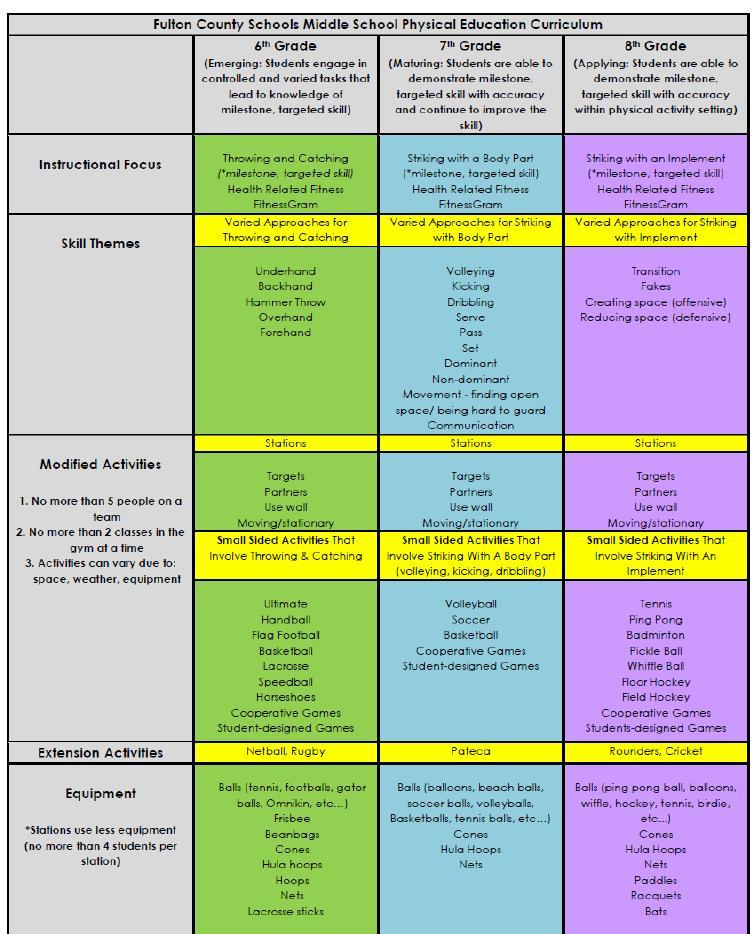Health & Physical Education
Philosophy
We believe a developmentally appropriate and comprehensive experience in health and physical education is essential for meeting the diverse needs of all students. Quality health and physical education programs foster growth and development through the cognitive, psychomotor, and affective learning domains. Physical education emphasizes skill-development, physical activity, health and skill-related fitness components, and lifetime enjoyment for being actively engaged in physical activity. In physical education, students will learn how to participate in a variety of activities and game-like situations which focus on various motor and manipulative skills, movement concepts, physical fitness, personal and social responsibility, self-expression, safety, and enjoyment.
In health, students learn how to live healthy lifestyles and reduce their risks for unhealthy behaviors. Additionally, age-appropriate instruction regarding personal health and wellness, mental and emotional health, safety and first aid, nutrition, tobacco, alcohol, marijuana, and other drugs, disease prevention, and sexual education. Participation in health and physical education is an integral and inseparable part of the K-12 educational experience.
Georgia Mandate
According to Georgia law, middle schools must offer health and physical education at every grade level. Local school districts should also conduct an annual fitness assessment program for all students in grades 6-8 within a physical education course a student is enrolled in that is taught by a certified physical education teacher.
Assessment
TMSA uses a variety of assessment methods throughout the school year to gauge student understanding of the state standards for health and physical education. Performance-based and cognitive assessments are thoughtfully designed to provide parents and students with comprehensive feedback of the students’ acquisition of state standards.
Health Education
Human Sexuality Education
TMSA will offer growth and development and human sexuality/HIV/AIDS education units to all students enrolled in a health course beginning in fifth grade. By state mandate, all public school systems in Georgia must include human sexuality as one facet of the comprehensive health education program. Our school system believes that all students should be equipped with factually accurate and appropriate information about these topics. Students who are armed with the facts are better informed to make healthy decisions. All content and instruction is implemented with sensitivity and are abstinence-based. However, the instruction that occurs in our schools should complement what is being taught at home and your values and expectations should be made very clear to your children.
The enhancement of health knowledge, attitudes and problem-solving skills are the focus of instruction.
- 6th grade is built on a comprehensive approach that focuses on the human body, growth and puberty, sexually-transmitted diseases and HIV/AIDS, prevention of sexually-transmitted diseases, and pregnancy with a focus on abstinence as the healthiest choice.
- 7th grade is built on a comprehensive approach that focuses on the functions of the male and female reproductive systems, sexually-transmitted diseases including HIV/AIDS, abuse, decision-making, and refusal skills.
- 8th grade is built on a comprehensive approach that centers around dating, refusal skills, developing healthy relationships, prevention of sexually-transmitted diseases and unwanted pregnancy with a focus on abstinence.

Physical Education
FitnessGram
As part of your child’s physical education program and their comprehensive health and physical education plan, individual levels of fitness will be tested using FITNESSGRAM, the state mandated fitness assessment program. The new version of FITNESSGRAM is now a five part comprehensive fitness assessment designed to measure cardiovascular fitness, muscular strength and endurance, flexibility, and body composition. This fitness assessment will be administered to all students in grades 1-12 that are enrolled in a physical education course regardless of age, gender, or ability. Students are encouraged to be self-aware of their health-related fitness and to take responsibility by setting personal fitness goals. When students focus on continually improving their levels of fitness, a positive and lifelong impact can be achieved. As part of this process, your child’s height and weight will be confidentially measured and recorded to determine the students Body Mass Index. Parent and/or guardians will receive a copy of their child’s FITNESSGRAM score report indicating their body composition, aerobic capacity, abdominal strength, upper body strength, and flexibility at the end of the school year. As the parent of a minor, Georgia law gives you the option of not having your child’s height and weight measured at school. If you choose to exempt your child from this portion of the FITNESSGRAM Test, you will need to notify the school and physical education teacher in writing, but you will still receive a copy of the report with this section left blank.

